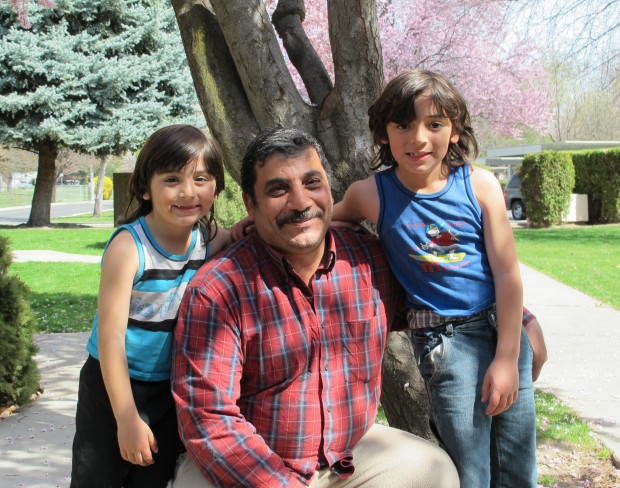Travel Loans Jeopardize Success For Idaho Refugees
The weak economy has exposed shortcomings in a little-known program of the U.S. State Department. Each year, tens of thousands of refugees arrive in the U.S. Most take out federally-funded loans to cover the cost of travel. But in this economy that has left so many without work, refugee advocates and refugees themselves say the travel loan program puts vulnerable people in an impossible bind. Some of those refugees are here, in Idaho.
Travel Loans Jeopardize Success For Idaho Refugees
It’s a sunny, spring afternoon, but the light is dim inside Qusay Alani’s east Boise apartment. He settles into an armchair to tell the story of his family’s long journey from Iraq to the U.S. A neighbor, also Iraqi, translates. “I left Iraq in 1997,” he says. “I went to Jordan.”
Alani says he left Iraq after he was jailed for refusing to join Saddam Hussein’s Baath Party. In Jordan, he says, he lived like a fugitive. As more and more Iraqis fled there, they were less and less welcome. Alani began the process of applying for refugee status. He didn’t aim to come to the U.S. He and his family simply needed to go somewhere. “Any country, I go to,” he says. “The only thing is just to protect my family. Because, you know, if I go back to Iraq I might get killed, you know. So – do my family.”

Molly Messick / StateImpact Idaho
Olson displays one of the several promissory notes she has seen that were signed with thumbprints. This loan agreement, for $6,904, is for a refugee family that came from Nepal.
In 2009, after years of waiting, Alani and his family learned they were bound for the United States. This is where the travel loan comes in.
“They gave us like a month prior,” Alani explains. “They told us – in a month ahead, you’re going to travel. Then a day before, they told us to come and sign for your tickets.”
Alani says that’s when he found out he would have to sign a loan for more than $4,500. He, his wife and three children were scheduled to leave Jordan the next day. Alani says there was nothing to do but sign. “We have no idea that, like, what is it, and we just got our ticket then,” Alani says. “If somebody is not signing, it means he’s not going to fly.”
Idaho Legal Aid attorney Zoe Ann Olson shuffles through a box of case files in her Boise office. She represents Qusay Alani and many others like him: refugees who have found themselves jobless in the fallout of the Great Recession. Olson is trying to get their loans waived or deferred. She says it was only a few years ago that refugee clients began seeking that help. “They would always bring us their travel loan bill,” she says. “I mean, almost every single one of them said, “I can’t pay my rent, but I also can’t pay this bill and I’ve got this bill.”
Olson realized how difficult it would be for refugees with little income or command of English to pay back thousands of dollars. She also wondered if they’d understood what they were getting into. As an example, she holds out a piece of paper. It’s from the file of a client who came from Tanzania. At the top, it reads, “Promissory Note.” At the bottom, under the word “Signatures” is a single thumbprint.

Molly Messick / StateImpact Idaho
Legal Aid attorney Zoe Ann Olson stands next to the many files of her travel loan clients.
“Here’s a bill for $10,306 that this person put their thumbprint on and agreed to, and they will not have the means to pay it back,” Olson says. “This promissory note is in English, and I’m certain they could not read it.”
Travel loan program guidelines require that loan documents be explained to loan recipients. But Olson says none of the people she represents felt they had any choice but to accept the loans and get to the United States.
Here’s how the program works: it’s funded by the Department of State. The loans are interest free. Refugees are supposed to pay them off within four years, or risk bad credit. It’s a system Bob Carey says doesn’t sit right, especially in this economy.
“There are inherent contradictions with bringing refugees here for humanitarian purposes, and then putting what may be an undue burden on them,” Carey says.
Carey oversees Resettlement and Migration Policy for the International Rescue Committee. The IRC has 22 offices across the United States that assist with refugee resettlement. When it comes to travel loans, resettlement agencies are middlemen. They don’t originate the loans, but they do collect payments.
Carey believes the loan program shouldn’t pursue struggling families for money they may not have. “It is wrong to expect refugees who are receiving public benefits who are in minimum wage jobs and are having difficulty supporting their families – to expect them to pay back a significant loan at that time,” he says.

International Rescue Committee
The International Recue Committee's Bob Carey is critical of the travel loan program.
The International Rescue Committee called for changes in the travel loan program three years ago. Carey says the IRC would like to see the loan program ended. The State Department isn’t there yet, but there is an effort underway to make changes, says Deborah Sisbarro, a spokeswoman for the State Department’s Bureau of Population, Refugees and Migration.
“We are, in fact, in the process of making improvements in the way the travel loan program works, yes,” she says.
Sisbarro says there will be a new informational website explaining the travel loan program. She says monthly loan payments will be capped according to income, and loan agreements will be translated into nearly a dozen languages. She says the changes should be in place by next year.
“The main thing that we’re trying to ensure is successful resettlement in the United States,” Sisbarro explains. “And so we don’t want to bring people here and set them up for failure. We want refugees to be resettled in the United States and be given the opportunity to succeed.”
Legal Aid attorney Zoe Ann Olson says she has filed a federal complaint in response to problems she’s observed in Idaho. In reporting this story, StateImpact requested interviews with current and former State Department officials and the official who oversees the travel loan program. None was available for an interview.
It’s midday on a Saturday, and Qusay Alani’s wife, Israa Al Mashhadani, is focusing her attention on a cutting board. She’s chopping onion for a special meal.
Al Mashhadani is a practiced cook, but she moves slowly in her small kitchen. She has a heart problem that means wearing a portable heart monitor. Her monthly Social Security check of just under $700 is her family’s one reliable source of income. When the subject of the travel loan comes up, Al Mashhadani turns still, and sad.
“When you have a loan, you must pay it. And we don’t have that much money to pay it,” she says. I ask whether she still receives the bills each month. “Um hm,” she replies. “Every month they send. And we send maybe $10, $15 only.”
Her husband, Qusay Alani, is a mechanic, but here he hasn’t found steady work.
I asked Alani how he feels about living in the U.S. On the one hand, he said, he’s grateful. He and his family can become citizens. But he also says what he’s found here is the opposite of a dream. He says his children may have opportunities, but he probably doesn’t. He worries about the money he owes, and the job he hasn’t yet secured.


